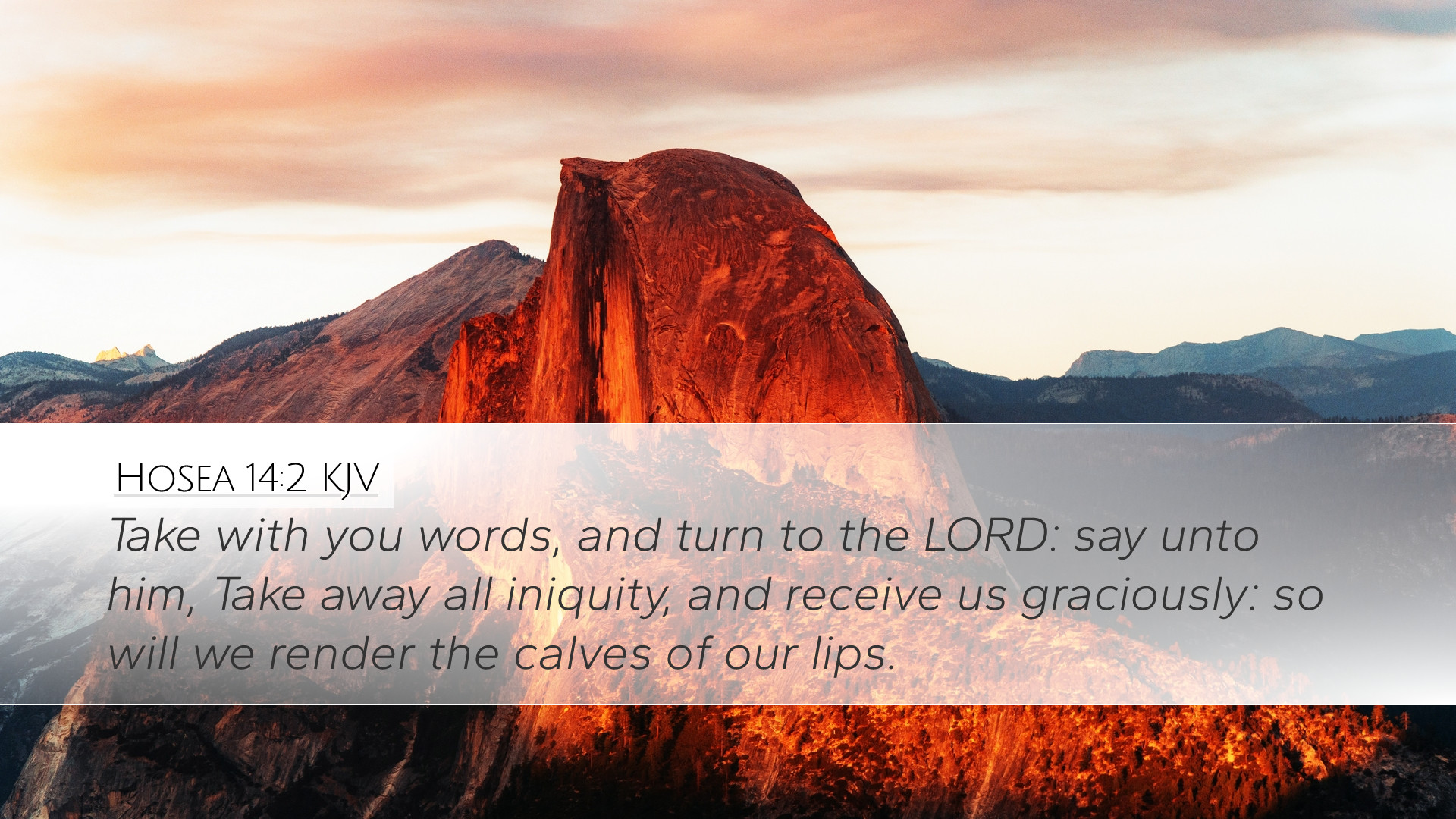Old Testament
Genesis Exodus Leviticus Numbers Deuteronomy Joshua Judges Ruth 1 Samuel 2 Samuel 1 Kings 2 Kings 1 Chronicles 2 Chronicles Ezra Nehemiah Esther Job Psalms Proverbs Ecclesiastes Song of Solomon Isaiah Jeremiah Lamentations Ezekiel Daniel Hosea Joel Amos Obadiah Jonah Micah Nahum Habakkuk Zephaniah Haggai Zechariah MalachiHosea 14:2
Hosea 14:2 KJV
Take with you words, and turn to the LORD: say unto him, Take away all iniquity, and receive us graciously: so will we render the calves of our lips.
Hosea 14:2 Bible Commentary
Bible Commentary on Hosea 14:2
Verse: "Take with you words, and turn to the LORD: say unto him, Take away all iniquity, and receive us graciously: so will we render the calves of our lips."
Introduction
The prophetic book of Hosea presents a poignant message of repentance and restoration. Hosea 14:2 serves as a concluding exhortation, inviting Israel to return to God with sincerity. This commentary synthesizes insights from noted public domain commentators such as Matthew Henry, Albert Barnes, and Adam Clarke, illuminating the theological and practical implications of this verse.
Analysis of Key Themes
-
Call to Repentance
Henry: Matthew Henry emphasizes the importance of a heartfelt return to God. The prophet encourages Israel to take the initiative in their repentance by coming to God with authentic words, acknowledging their sins and seeking His mercy.
Barnes: Albert Barnes further elaborates that the phrase "Take with you words" signifies the need for a structured approach to repentance. It reflects an understanding that approaching God requires recognizing past failures and articulating a desire for reconciliation.
Clarke: Adam Clarke notes that the act of bringing words symbolizes a deliberate engagement with God, indicating that Israel is not to approach God passively but with earnestness and intent to change their ways.
-
Divine Forgiveness
Henry: The second part of the verse, "Take away all iniquity," highlights the profound theme of God’s readiness to forgive. Henry remarks that God's grace is paramount and that through confession and prayer, believers may find relief from their sins.
Barnes: Barnes underscores that the plea to "receive us graciously" implies God’s disposition towards mercy. He argues that genuine contrition can lead to divine forgiveness, reinforcing the idea that God desires to restore His people.
Clarke: Clarke adds that the request for grace indicates a belief in divine benevolence, which stands in contrast to the people’s sins. This plea encapsulates the hope that God's love exceeds their transgressions.
-
Worship and Sacrifice
Henry: In the final clause, "so will we render the calves of our lips," Henry interprets this as a metaphor for worship. True repentance leads to a genuine offering, not of animals but of praise and thanksgiving, signifying a shift from ritual to relational worship.
Barnes: Barnes explains that the "calves of our lips" suggests that verbal expressions of gratitude and worship are akin to the sacrifices prescribed by the Law. This reframes worship as a response to God’s mercy, rooted in sincerity rather than mere tradition.
Clarke: Clarke highlights that this metaphor emphasizes the significance of vocal praise. He also points out that God desires the inner devotion of His people more than external sacrifices, reflecting a true relationship with Him.
Theological Implications
The message within Hosea 14:2 resonates through various theological themes relevant to pastors, students, and theologians:
-
Repentance as a Process
This verse illustrates that repentance is not merely an emotional response but a conscious act involving recognition, articulation, and action. A self-aware acknowledgment of sin is essential for anyone seeking to restore their relationship with God.
-
The Assurance of Forgiveness
The assurance that God is ready to receive those who return to Him highlights the overarching theme of grace permeating the Scriptures. It demonstrates that despite human failings, God’s mercy is accessible to all who earnestly seek it.
-
Worship as a Response to Grace
The idea that vocal worship is an acceptable offering underscores the reformation of what worship means in the life of a believer. Worship derived from a place of gratitude for God’s forgiving nature emphasizes the relational aspect of faith.
Conclusion
In summary, Hosea 14:2 serves as a critical reminder for believers of the steps toward genuine repentance and restoration with God. The insights from Matthew Henry, Albert Barnes, and Adam Clarke enrich our understanding of this passage, urging us to approach God with earnest words, to seek His forgiveness, and to express our gratitude through heartfelt worship. For pastors and scholars alike, this verse encapsulates core Christian principles of repentance, grace, and worship, inviting continuous reflection on the nature of our relationship with God.


